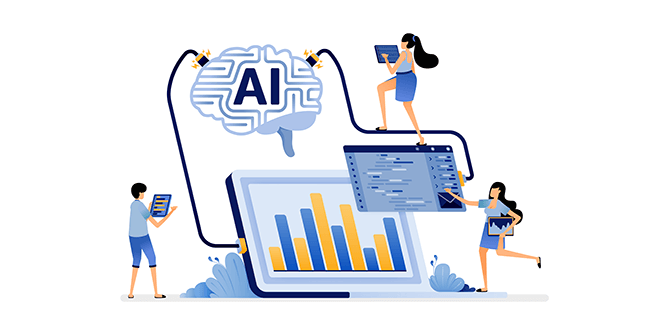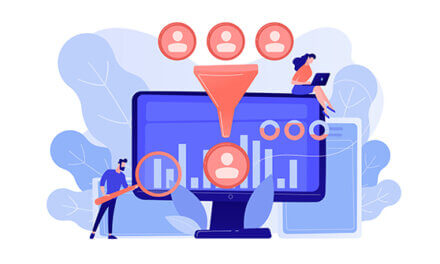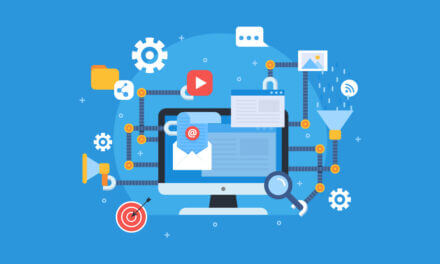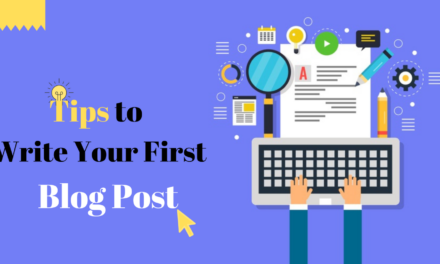Key Takeaways
- AI in marketing refers to the use of artificial intelligence to analyze data, predict outcomes, and automate marketing tasks.
- AI encompasses technologies like machine learning, natural language processing, and computer vision.
- Popular AI tools include voice-activated virtual assistants like Alexa, Siri, and Google Assistant.
- Future trends in AI and marketing include hyper-personalization, predictive insights, voice and visual search, augmented reality, and AI-generated content.
If you talk to any marketer or business enthusiast, they will all tell you that the rumblings of change in the marketing world have never been as strong as they are today.
It is the rise of artificial intelligence (AI) that’s shaking up the landscape and transforming the way we approach marketing strategies.
And while some industries are still contemplating the idea of integrating AI into their operations, marketing is surely among the first that has jumped to action.
Currently, 61.4% of marketers are using AI tools in their daily marketing activities, and 88% believe that companies should make more extensive use of AI to boost customer satisfaction levels.
Regardless of which side you’re on, you’ll find this article an interesting read. Further down, we’ll dive deep into the role of AI in shaping future marketing strategies and explore how businesses can harness its power to succeed.
This will help you gain a broader understanding of the AI ecosystem and make an informed decision about whether you need it or not.
Understanding AI in marketing
First things first, let’s clear the air and understand what AI in marketing truly means.
AI, in simple terms, refers to the ability of machines to imitate human intelligence. But in marketing, it’s more like a super-smart marketing wizard that can analyze vast amounts of data faster than the most experienced business analyst!
In marketing, AI encompasses various technologies, such as:
- Machine learning – a type of AI that helps AI algorithms to improve and make accurate predictions of the outcomes,
- Natural language processing – AI branch that empowers machines with the ability to understand both spoken and written human language,
- Computer vision – AI’s “eyes” that enable computers to recognize and analyze images, videos, maps, etc.
Molded together, these technologies create a powerhouse that’s transforming the way marketing is done. It’s like having a dream team of data scientists, language interpreters, and visual wizards working tirelessly to decode the secrets behind your customers’ minds and actions.
While AI can successfully be used by any industry, marketing benefits from it the most. The industry that directly relies on predictions of customer behavior and communication can take the game to the whole next level with an ally like AI. Translated in numbers, the boost in customer satisfaction can be as high as 25%, according to Gartner research.
And while we’re still at the beginning of AI’s rise, its phenomenal impact is undeniable.
Just think of all the AI tools we already use every day. Smart home appliances have become an important part of our lives. Along with them come voice-activated virtual assistants like Amazon’s Alexa, Apple’s Siri, and Google Assistant — our faithful digital companies that answer questions, set reminders, and help control smart devices with a simple voice command.
To give you the gist, 97% of mobile users regularly use AI-driven voice assistants. How big is this number? Given that in 2022, there were over 6.4 billion smartphone users out of the total 8 billion, this number is huge!
As you’d imagine, all of the tools that customers use every day generate data, which companies need to interpret and analyze quickly. And that’s where AI shines the best.
Gone are the days when analysts had to compile and process bottomless Excel worksheets. AI-driven software solutions can process and analyze vast amounts of data, providing valuable insights, such as:
- What type of customers engage with them most often,
- What their preferences are,
- What keywords they input when searching for a product or service,
- What products and services they were searching for on the Internet in the past,
- Their demographics, budget, and needs.
Armed with this information, marketers can segment their customers and deliver targeted marketing campaigns that speak directly to their customers’ needs and desires. This personalization ultimately leads to increased conversions and enhanced brand loyalty.
The role of AI in various areas of marketing
Now let’s find out how AI is changing the different areas of marketing, with a focus on each of them.
AI in content marketing
Content creation is both an art and a science. AI brings the scientific approach by analyzing vast amounts of data to better understand what type of content appeals to your target audience and where it’s best to share.
What’s more, AI tools can do all the heavy lifting for you. From automated content generation with tools like ChatGPT, Perplexa, and others, to optimizing headlines, keywords, and CTAs, nothing is beyond AI’s capabilities.
Whether you need blog posts, social media updates, product descriptions, or email newsletters, AI can handle it all. The best thing is, AI-generated texts come out as engaging and grammatically correct as if they were written by a copywriter.
Moreover, content marketers can further enhance their AI-generated texts by utilizing AI editing software to create striking, on-brand visuals that elevate their messaging and captivate their target audience. In addition, they can take advantage of automation tools to help minimize their content marketing efforts.
Aside from content creation, AI-powered tools lend you a helping hand in tracking user interactions and engagement metrics. Once they recognize certain patterns, they can point you to the topics, formats, and styles that drive the most traffic and conversions.
These data-driven insights help marketers fine-tune their strategy, creating content that best matches their customers’ interests, similar to how coindataflow.com shows Dogecoin forecast for 2025 to guide investors.
Furthermore, they enable them to identify content gaps and underperforming articles, allowing for continuous improvement in content marketing efforts.
On top of that, AI tools can provide real-time insights into the topics that customers are talking about. This knowledge can then be put into crafting compelling articles that spark communication and shares.
When planning a content marketing strategy, it’s also important to know what tactics are best to avoid so they do not negate all the efforts.
AI-driven digital advertising
Creating content is one thing, but effectively reaching the right audience is a whole new ball game in the digital advertising arena. This is where AI-driven digital advertising steps in, bridging the gap between brands and potential customers.
AI algorithms excel at crunching numbers and analyzing data to identify the best moments to show your ads. Moreover, they are not limited to channels. Based on data-driven analysis, they will deliver your message to the right audience at the most opportune times, whether through search engine ads, social media promotions, display advertising, or video ads.
Furthermore, AI-driven A/B testing takes the guesswork out of ad optimization. Instead of relying on gut feelings, AI can quickly test multiple ad variations and determine which ones perform best, helping marketers to fine-tune their campaigns for optimal results.
QR Codes similarly streamline customer engagement further enhancing the effectiveness of marketing strategies.
To take your digital campaigns up to the next level, make sure to look into the best marketing digital tools that can be implemented into your workflows.
AI in social media marketing
Social media has become a goldmine of customer insights and conversations. No wonder SMM has become a cornerstone of modern marketing strategies.
According to research in 2021, a whopping 4.48 billion people are on social media, and they visit around 6.6 platforms on average. As you can imagine, this whole lot is sharing their thoughts and experiences, providing a treasure trove of valuable data for marketers to dig into and analyze.
AI in SMM is the game changer that unlocks the potential hidden within this massive data pool. Take AI-driven social listening tools, for instance.
With their help, companies can keep tabs on mentions of their brands and products, and get a clear picture of what exactly customers are saying. That means they can address any concerns and issues quickly and effectively.
Additionally, these nifty tools can also sift through the sea of influencers to find the ones who can amplify the brand’s message and expose it to a wider audience. This way, marketers can supercharge their social media game and make a real impact on their target audience.
Also, let’s not forget about chatbots. These smart virtual assistants can not only substitute for a team of customer support agents but also increase conversions and drive sales, offering personalized recommendations based on customers’ preferences and past purchases.
AI in email marketing
According to stats, 35% of email marketers send on average 3-5 emails every week. Even without looking at these numbers, it’s enough to take a glimpse at your own inbox to understand the flow of emails sent to customers every day.
How many of these emails do you personally open? We bet only those that particularly stand out or sound personal.
That’s where AI-driven email marketing tools come into play. Instead of sending blast emails, most of which go straight into the trash, they can help create killer campaigns with personalized messages tailored to each recipient’s interests and behaviors.
Taking advantage of AI is instrumental in modern marketing. Using a tool like Insider’s customer journey orchestration platform, Architect, can significantly enhance the effectiveness and efficiency of email campaigns. It helps in creating tailor-made interactions across all customer touchpoints for more cohesive experiences.
Not only that, but AI tools can also dynamically customize email content, including product recommendations, offers, and content based on customers’ purchase history and past interactions. With this level of personalization, AI-generated emails are sure to capture the attention and be clicked on.
Where AI also shines is in its ability to optimize email send times.
Traditionally, it’s been known that the best times to send emails are 8 am, 9 am, 10 am, 1 pm, and 3 pm. However, in the highly competitive digital commerce space, the one-size-fits-all approach of email blasts doesn’t work anymore.
The key to success is sending emails at times when people are most likely to open them, which can be at any time of the day.
Moreover, AI web scraping takes data analysis to a new level by efficiently extracting valuable information from websites. With AI-powered tools, businesses can gather relevant data at scale, providing insights that drive strategic decision-making.
This advanced technique enhances competitive analysis, market research, and trend identification. This all helps marketers take their email campaigns to a new higher level.
Future trends in AI and marketing
The AI journey is far from over. In fact, we’ve only scratched the surface of its potential, and as we move into the future, we can expect even more exciting trends and advancements in AI in marketing.
While we can’t predict with accuracy what’s going to happen, there are a few exciting trends that are already on the horizon. Here are some of them:
- Hyper-personalization. Marketing campaigns will become even more personalized, with tailored messages that speak directly to each customer’s unique needs and preferences.
- Predictive customer insights. AI’s predictive capabilities will evolve further, enabling marketers to anticipate customers’ needs and behaviors with greater accuracy and deliver relevant content at the right time.
- Voice and visual search optimization. People will not stop using voice queries to look up information, making it important for marketers to adapt their SEO strategies to accommodate new search paradigms.
- Augmented Reality (AR) and Virtual Reality (VR) experiences. Interactive environments will become more common, with more companies incorporating AR and VR into their marketing strategies.
- Real-time customer support. In-house teams of customer support agents will go to oblivion, with AI chatbots effectively replacing them, utilizing realistic text to speech technology for engaging interactions.
- AI-generated content. Content generation tools will become more advanced and sophisticated, making them suitable for crafting all types of content, from expert studies to fun blog posts.
- Enhanced data privacy and security. As AI becomes more embedded in marketing processes, more attention will be paid to how it handles sensitive customer data.
- Autonomous marketing campaigns. The approach to planning and executing marketing campaigns will also be changed a lot, with most processes, from segmenting customers to choosing ad placements, being automated.
Conclusion
AI is no longer a buzzword as many people thought of it a few years ago. It’s the reality that we’re all stepping down, and marketing, more than any other industry, can feel its powerful impact.
From content creation to digital advertising and local media marketing, there’s no area where AI can’t give a hand, making it the leading technology that’s shaping the future of marketing strategies.
And if you’re looking to prosper in the digital commerce space, it’s high time you started implementing it in your marketing processes. If you don’t act now, you risk falling behind the competition.




